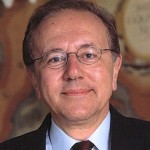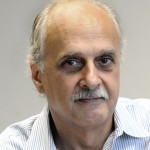Panos Antsaklis
 Panos Antsaklis is the Brosey Professor of Electrical Engineering at the University of Notre Dame. He is a graduate of the National Technical University of Athens, Greece, and holds MS and PhD degrees from Brown University. His research addresses problems of control and automation and focuses on control systems that exhibit high degree of autonomy. His recent research focuses on the design of Cyber-Physical Systems using passivity and dissipativity. He had co-authored three research monographs on discrete event systems and on model-based control of networked systems, two graduate textbooks on Linear Systems and has coedited six books on Intelligent Autonomous Control, Hybrid Systems and Networked Embedded Control Systems. He is IEEE, IFAC and AAAS Fellow, the 2006 recipient of the Engineering Alumni Medal of Brown University and a 2012 honorary doctorate recipient from the University of Lorraine, France. He is the Editor-in-Chief of the IEEE Transactions on Automatic Control.
Panos Antsaklis is the Brosey Professor of Electrical Engineering at the University of Notre Dame. He is a graduate of the National Technical University of Athens, Greece, and holds MS and PhD degrees from Brown University. His research addresses problems of control and automation and focuses on control systems that exhibit high degree of autonomy. His recent research focuses on the design of Cyber-Physical Systems using passivity and dissipativity. He had co-authored three research monographs on discrete event systems and on model-based control of networked systems, two graduate textbooks on Linear Systems and has coedited six books on Intelligent Autonomous Control, Hybrid Systems and Networked Embedded Control Systems. He is IEEE, IFAC and AAAS Fellow, the 2006 recipient of the Engineering Alumni Medal of Brown University and a 2012 honorary doctorate recipient from the University of Lorraine, France. He is the Editor-in-Chief of the IEEE Transactions on Automatic Control.
Keynote at EBCCSP:
Model-based event-triggered control for networked systems
In the Model-Based approach to the control of Networked Systems (MB-NCS) a nominal approximate model of the plant dynamics is used to estimate the state of the plant during the intervals of time feedback measurements are not available to the controller. It has been common practice in MB-NCS to reduce network usage by primarily using periodic updates. Time varying update intervals can be and have been used. The update intervals may also be decided based on the current conditions and response of the plant as it is the case in Event-Triggered Control (ETC). The MB-NCS framework will first be introduced and results of ETC in MS-NCS will be discussed.
Karl Henrik Johansson
Karl Henrik Johansson is Director of the KTH ACCESS Linnaeus Centre and Professor at the School of Electrical Engineering, Royal Institute of Technology, Sweden. He is a Wallenberg Scholar and has held a six-year Senior Researcher Position with the Swedish Research Council. He is Director of the Stockholm Strategic Research Area ICT The Next Generation. He received MSc and PhD degrees in Electrical Engineering from Lund University. He has held visiting positions at UC Berkeley (1998-2000) and California Institute of Technology (2006-2007). His research interests are in networked control systems, hybrid and embedded system, and applications in transportation, energy, and automation systems. He has been a member of the IEEE Control Systems Society Board of Governors and the Chair of the IFAC Technical Committee on Networked Systems. He has been on the Editorial Boards of several journals, including Automatica, IEEE Transactions on Automatic Control, and IET Control Theory and Applications. He is currently on the Editorial Board of IEEE Transactions on Control of Network Systems and the European Journal of Control. He has been Guest Editor for special issues, including the one on “Wireless Sensor and Actuator Networks” of IEEE Transactions on Automatic Control 2011. He was the General Chair of the ACM/IEEE Cyber-Physical Systems Week 2010 in Stockholm and IPC Chair of many conferences. He has served on the Executive Committees of several European research projects in the area of networked embedded systems. In 2009, he received the Best Paper Award of the IEEE International Conference on Mobile Ad-hoc and Sensor Systems. In 2009, he was also awarded Wallenberg Scholar, as one of the first ten scholars from all sciences, by the Knut and Alice Wallenberg Foundation. He was awarded an Individual Grant for the Advancement of Research Leaders from the Swedish Foundation for Strategic Research in 2005. He received the triennial Young Author Prize from IFAC in 1996 and the Peccei Award from the International Institute of System Analysis, Austria, in 1993. He received Young Researcher Awards from Scania in 1996 and from Ericsson in 1998 and 1999. He is a Fellow of the IEEE.
Keynote at EBCCSP:
Event-based control of multi-agent systems
Yannis Tsividis
 Yannis Tsividis received the B.S. degree from the University of Minnesota, Minneapolis, and the M.S. and Ph.D. degrees from the University of California, Berkeley, in 1972, 1973, and 1976, respectively. He is Charles Batchelor Professor of Electrical Engineering at Columbia University, New York, NY. His research has dealt with mixed analog-digital integrated circuits at the device, circuit, system, and computer simulation level. He has received the 1984 IEEE W.R.G. Baker Award for the best IEEE publication, and is recipient or co-recipient of best paper awards from the IEEE International Solid-State Circuits Conference in 2003, and the IEEE Circuits and Systems Society (Darlington Award, 1987; Guillemin-Cauer Award, 1998 and 2008). He has received the IEEE Undergraduate Teaching Award in 2005, and the IEEE Circuits and Systems Education Award in 2010. He is a Fellow of the IEEE, and received the IEEE Gustav Robert Kirchhoff Award in 2007.
Yannis Tsividis received the B.S. degree from the University of Minnesota, Minneapolis, and the M.S. and Ph.D. degrees from the University of California, Berkeley, in 1972, 1973, and 1976, respectively. He is Charles Batchelor Professor of Electrical Engineering at Columbia University, New York, NY. His research has dealt with mixed analog-digital integrated circuits at the device, circuit, system, and computer simulation level. He has received the 1984 IEEE W.R.G. Baker Award for the best IEEE publication, and is recipient or co-recipient of best paper awards from the IEEE International Solid-State Circuits Conference in 2003, and the IEEE Circuits and Systems Society (Darlington Award, 1987; Guillemin-Cauer Award, 1998 and 2008). He has received the IEEE Undergraduate Teaching Award in 2005, and the IEEE Circuits and Systems Education Award in 2010. He is a Fellow of the IEEE, and received the IEEE Gustav Robert Kirchhoff Award in 2007.
Keynote at EBCCSP:
Data conversion and digital signal processing using event-based, continuous time techniques
Many new and emerging applications require extremely low power dissipation in order to preserve scarce energy resources; such applications include sensor networks and wearable/implantable/ingestible biomedical devices. In such cases, uniform sampling, as used in conventional, clocked circuits, represents undesirable and unnecessary energy waste. We review techniques in which the signal itself dictates when it needs to be sampled and processed, thus causing energy use only when demanded by the information in it. Methods for implementing event-driven A/D converters and DSPs in this context, without using any clock, are reviewed. It is shown that, compared to traditional, clocked techniques, the techniques reviewed here produce circuits that completely avoid aliasing, respond immediately to input changes, result in better error spectral properties, and exhibit dynamic power dissipation that goes down when the input activity decreases. Experimental results from recent test chips, operating at kHz to GHz signal frequencies, fully confirm these properties.